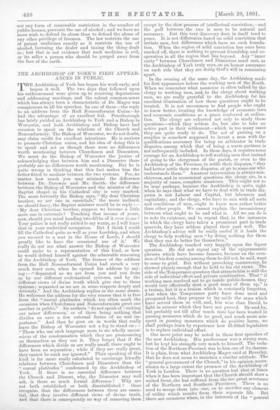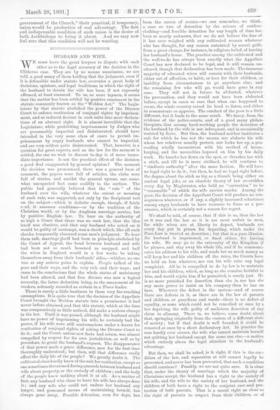THE ARCHBISHOP OF YORK'S FIRST APPEAR- ANCES IN PUBLIC. T HE
Archbishop of York has begun his work early, and begun it well. The two days that followed upon his enthronement were given up to receiving deputations and addressing meetings, and the robust common-sense which has always been a characteristic of Dr. Magee was conspicuous in all his speeches. In one of them—the reply to an address from the Hull Nonconformist Union—he had the advantage of an excellent foil. Peterborough has lately yielded an Archbishop to York and a. Bishop to Worcester, and both Archbishop and Bishop have had occasion to speak on the relations of the Church and Nonconformity. The Bishop of Worcester, wo do not doubt, may claim credit for excellent intentions. He is anxious to promote Christian union, and his idea of doing this is to speak and act as though there were no differences worth mentioning between Churchmen and Dissenters. We must do the Bishop of Worcester the justice of acknowledging that between him and a Dissenter there probably are no differences worth mentioning. But he is quite wrong in thinking that this fact makes him the better fitted to mediate between the two systems. For, no matter how much you may minimise the difference between Dr. Perowne and Mr. Smith, the difference between the Bishop of Worcester and the minister of the Baptist chapel in his Cathedral city is very marked. The more fervently the Bishop says, "My dear Christian brother, we are one in essentials," the more inclined, we should fancy, the Baptist minister would be to reply :- 'My dear Christian brother, suppose we become a little more one in externals ? Touching that income of yours, now, should you mind handing two-fifths of it over to me ? Your palace is not really suited to my wants, so I will leave that in your undivided occupation. But I think I could fill the Cathedral quite as well as your Lordship, and when you succeed to a seat in the House of Lords, I should greatly like to have the occasional use of it.' We really do not see what answer the Bishop of Worcester could make to a representation of • this kind, or how he would defend himself against the admirable reasoning of the Archbishop of York. The framer of the address from the Hull Nonconformist Union had struck a very much truer note, when he opened his address by say- ing :—" Separated as we are from you and you from us by our different ecclesiastical systems, and by the different views of divine truth which give rise to these systems ; separated as we are in some respects deeply and seriously." And the Archbishop replies in the same strain. He welcomes the address for the very reason that it is free from the " unreal platitudes which too often mark the occasions when Churchmen and Nonconformists greet one another in public." Its authors " do not speak of ' sinking our minor differences,' or of there being nothing that divides us save a few external forms of no real im- portance." And then he goes on in words that really leave the Bishop of Worcester not a leg to stand on :— " Those who use such language seem to me wholly uncon- scious of the condemnation which they are pronouncing on themselves as they use it. They forget that if the differences which divide us are really small, there ought to have been no separation ; while if they are really great, they cannot be sunk nor ignored." Plain speaking of this kind is far more really calculated to encourage friendly relations between Churchmen and Dissenters than the " unreal platitudes " condemned by the Archbishop of York. If there is no essential difference between the Church and Dissent, why, the Dissenter may well ask, is there so much formal difference ? Why are not both established or both disestablished ? Once recognise that the differences between them are essen- tial, that they involve different views of divine truth, and that there is consequently no way of removing them except by the slow process of intellectual conviction,—and the gulf between the two is seen to be natural and necessary. But this very discovery does in itself tend to peace. It is not differences based on solid conviction that irritate men, but differences which have no such founda- tion. When the region of solid conviction has once been marked off, there is nothing to prevent friendship and co- operation in all the region that lies beyond. Any "inner unity" between Churchmen and Dissenters must rest, as the Archbishop of York truly says, on an honest assurance on each side that they are doing God's will in remaining apart. In the evening of the same day, the Archbishop made his first appearance before the working men of the North. When we remember what nonsense is often talked by the clergy to working men, and to the clergy about working men, we are really grateful to the Archbishop for his excellent illustration of how these questions ought to be treated. It is not uncommon to find people who ought to know better, treating the knowledge of economic laws and economic conditions as a grace conferred at ordina- tion. The clergy are exhorted not only to study these questions—which they seldom do, but also to take an active part in their settlement—which in too many cases they are quite ready to do. The act of putting on a surplice is somehow supposed to invest a man with the qualifications necessary for being an arbitrator in trade disputes, among which that of being a warm partisan is not unfrequently included, In these days, it requires some courage for an Archbishop to tell working men that instead of going to the clergyman of the parish, or even to the Archbishop of the Province, to settle their disputes, " they had better settle their own disputes, o1 go to some one who understands them." Amateur intervention is always mis- chievous, and in economical questions the clergy are, in a majority of cases, complete amateurs. This ought not to be true perhaps, because the Archbishop is quite right when he says that what we have to deal with in trade dis- putes is not Labour and Capital, but labourers and capitalists ; and the clergy, who have to mix with all sorts and conditions of men, ought to know men rather better than other people. We cannot explain the inconsistency between what ought to be and what is. All we can do is to note its existence, and to repeat that, in the instances in which the clergy have taken a prominent part in trade quarrels, they have seldom played their part well. The Archbishop's advice will be really useful if it leads the clergy to help working men "by doing nothing for them that they can do better for themselves." The Archbishop touched very happily upon the liquor question. He did not repeat any of the epigrammatic phrases which have become famous, because on the occa- sion of his first coming among them he did not, he said, want to come to grief. But without provoking controversy, he showed plainly enough that he held to his old views. The side of the Temperance question that attracts him is still the side of individual effort and private combination. That " if working men resolved not to go inside public-houses, they would very effectually shut a good many of them up," is i a truism, but it is a truism which is constantly forgotten. Just when the Temperance party have done most and prospered best, they propose to lay aside the arms which have served them so well, and, less wise than David, to fight in armour which they have not proved. By-and-by, but probably not till after much time has been wasted in passing measures which do no good, and much more mis- spent in passing measures which do positive harm, we shall perhaps learn by experience how ill-fitted legislation is to replace individual effort.
One more point may be noted in these first speeches of the new Archbishop. His predecessor was a strong man, but he kept his strength very much to himself. The isola- tion of the Northern Province was to him one of its charms. It is plain, from what Archbishop Magee said at Beverley, that he does not mean to maintain a similar attitude. The " general government of the Church," in his opinion, neces- sitates to a large extent the presence of the Archbishop of York in London. There is no question but that at times when it has been important that the Church should show a united front, she has suffered from the too great severance of the Northern and Southern Provinces. There is no need to merge them into one, or to sacrifice any element of utility which results from their separate life. But there are occasions when, in the interests of the " general government of the Church," their practical, if temporary, union would be productive of real advantage. The first and indispensable condition of such union is the desire of both Archbishops to bring it about. And we may now feel sure that this condition will not be wanting.



































 Previous page
Previous page